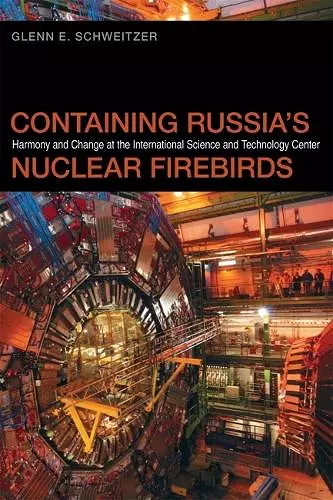Containing Russia's Nuclear Firebirds
Harmony and Change at the International Science and Technology Center
Format:Paperback
Publisher:University of Georgia Press
Published:1st Jan '13
Should be back in stock very soon

In Containing Russia’s Nuclear Firebirds, Glenn E. Schweitzer explores the life and legacy of the International Science and Technology Center in Moscow. He makes the case that the center’s unique programs can serve as models for promoting responsible science in many countries of the world.
Never before have scientists encountered technology with the potential for such huge impacts on the global community, both positive and negative. For nearly two decades following the Soviet Union’s breakup into independent states, the ISTC has provided opportunities for underemployed Russian weapon scientists to redirect their talents toward civilian research. The center has championed the role of science in determining the future of civilization and has influenced nonproliferation policies of Russia and other states in the region. Most important, the center has demonstrated that modest investments can encourage scientists of many backgrounds to shun greed and violence and to take leading roles in steering the planet toward prosperity and peace.
Schweitzer contends that the United States and other western and Asian countries failed to recognize the importance, over time, of modifying their donor-recipient approach to dealing with Russia. In April 2010 the Russian government announced that it would withdraw from the ISTC agreement. After expenditures exceeding one billion dollars, the ISTC’s Moscow Science Center will soon close its doors, leaving a legacy that has benefited Russian society as well as partners from thirty-eight countries. Schweitzer argues that a broader and more sustained movement is now needed to help prevent irresponsible behavior by dissatisfied or misguided scientists and their patrons.
Glenn Schweitzer’s intimate knowledge of Russia’s scientific enterprise provides new insights as to how the International Science and Technology Center became a key component of the global effort to reduce the risks of proliferation of dual-use technologies. His personal interactions with scientists throughout Russia provide a treasure trove of information for policy officials and scholars who will reflect on the center’s accomplishments and the valuable lessons learned for the future.
* cochairman of the Nuclear Threat Initiative *The risky and unpredictable transformation period in the early 1990s from the Soviet Union to the Russian Federation and many new independent states had numerous heroes in media headlines. But there were others working far away from the spotlights to resolve one of the greatest dangers our planet faced: the risks of WMD proliferation and the spread of weapons expertise. This is the fascinating story of the ISTC in Moscow, an organization that for two decades played a major role in mitigating those risks.
* Royal Institute of Technology in Stockholm and Former Deputy Executive Director of the ISTC *Schweitzer presents a unique perspective on the recent history and future prospects of the ISTC and the reasons for its decline as far as the Russian Federation is concerned. He has had unparalleled access to decision makers and administrators who impacted the ISTC throughout its history. I recommend this book to serious students of nonproliferation and to those who closely follow all aspects of U.S.-Russian relations.
* Senior Science Advisor to U.S. Department of State for Science Centers in Russia and Ukraine *Containing Russia’s Nuclear Firebirds is an excellent analysis of the International Science and Technology Center (ISTC). . . . This book offers lessons for 2013 and beyond for combating international weapons proliferation.
* ChoiceISBN: 9780820344348
Dimensions: 229mm x 152mm x 23mm
Weight: 476g
288 pages